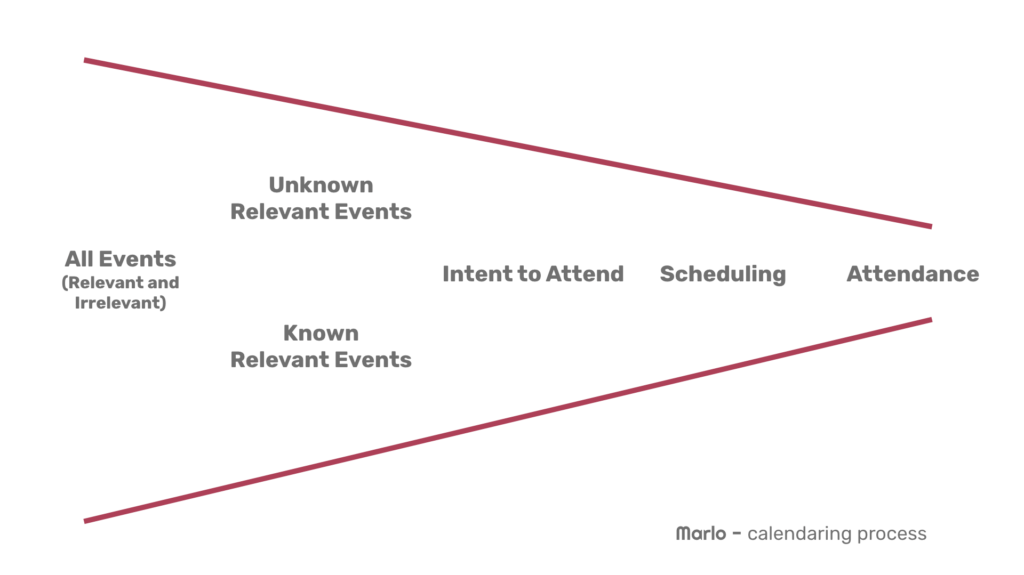It’s Only A Matter Of Time: ML Sets Its Sights On Your Calendar

At Marlo, we're building an AI engine for time management. We're starting with an MVP to solve event discovery for HBS students – want early access? (https://www.getmarlo.com)
Consumers are increasingly spending more time immersing in digital activities or logging their physical experiences on online cloud-based platforms. Consequently, the amount of data generated on how people are spending their time has been growing at an exponential rate. My co-founder, John Keck, and I created Marlo because we hypothesize that by leveraging that data, Machine Learning can help you manage your time.
Marlo’s mission is simple: we believe that time is your most valuable asset, and we want to ensure that it is well spent. For those of you more financially minded, we hope to maximize your ROI, return of happiness on your time investment. To test our hypothesis and build a minimum viable product (MVP), we’ve targeted a problem that faces every Harvard Business School student: event discovery. Our initial product version aggregates all events happening around HBS (from sources like MBA Digest, 12Twenty, and Club listservs, as well as Facebook and Eventbrite), curates events for users based on their specific profiles, and places them seamlessly on their calendar.
The use of Machine Learning in the calendar is not unprecedented. Companies like Clara and x.ai have built intelligent assistants that handle calendar coordination to replace the typical back-and-forth of finding a common time and meeting scheduling [1].
If we think about the calendaring process as a funnel, we can more easily differentiate between the current applications of ML in the space.
Many of the current applications of ML in the calendar focus on the downstream scheduling logistics, but the burden of up-funnel event sourcing still lies with the individual. Harvard Business Review recently speculated about a potential development to time management software:
“A calendar that learns patterns could give an executive assistant more time for the human specialties of his job, such as helping his boss to manage a team.” [2]
A realization of this application would certainly move the value proposition upstream, though only to known relevant events, i.e. events that the user would already be aware of. Marlo’s value proposition posits that the majority of relevant events to a user are not previously known to the individual.
In an alternative application, Google’s Calendar employs machine learning to help users accomplish their personal goals through intelligent reminders and dedicated time for achieving their aspirations [3]. Although the user is still creating/sourcing the actual event, Google understands that repetition is hard to self-enforce and this specific algorithm operates in the “Intent to attend” region of the funnel.
For Marlo’s MVP, we are using word2vec, a group of natural language processing related models developed by Google, to curate events for users based on their profile. At a high level, word2vec creates mathematical vectors and vector spaces out of a body of text and individual words. By training the algorithm on corpus’ of text, word2vec develops multidimensional vectors with words that are similar to the “base word” allocated by distance [4]. Marlo’s algorithm scrapes event descriptions and creates a vector for each event. Simultaneously by connecting to each users calendar, Marlo understands where they have been spending time in the past and creates a vector based on the events the user has attending. By then measuring vector distance between potential matches for events and the user, Marlo intelligently recommends events and adds them to the user calendar.
Like all machine learning models, Marlo becomes more effective over time with more access to event data. By also tracking the accept/decline rate on its suggested events, we can more accurately define each users’ vector based on their interests. In an age where our time is increasingly being consumed by technology, we’re hoping to leverage that same technology to help us spend time with greater purpose and fulfillment. Apple is attacking this from a different angle. In their latest release of their iOS operating system, Screen Time was introduced to make users aware of their time spent on apps and encourage breaks [5].
As we’re receiving data and user feedback from our MVP, we’re also thinking about the long term business model and product vision. The software-based calendar application we all interact with today was invented decades ago. It looks a lot like excel, and more importantly takes significant effort to manage. Our vision of a modern “calendar” is one that is designed ground-up with UI/UX principles, mobile friendly, and intelligent. We plan to expand Marlo to the greater Boston area, and use our integration into users’ Calendar’s as a paid marketing platform for event organizers to promote and target their attendees within.
As we scale Marlo, one critical question we are asking ourselves is: how do we make this bigger than just HBS or students in general? What would be an effective way of providing a similar service, but for those who don’t use a calendar app to manage their time?
(799 words)
[1] Zilis, Shivon. “Machine Intelligence Will Let Us All Work Like CEOs.” Harvard Business Review, 24 Apr. 2017, hbr.org/2016/06/machine-intelligence-will-let-us-all-work-like-ceos.
[2]Martinho-Truswell, Emma. “3 Questions About AI That Nontechnical Employees Should Be Able to Answer.” Harvard Business Review, 21 Sept. 2018, hbr.org/2018/08/3-questions-about-ai-that-nontechnical-employees-should-be-able-to-answer.
[3]Shu, Catherine. “Google Calendar’s Newest Feature Uses Machine Learning to Help You Actually Accomplish Your Goals.” TechCrunch, TechCrunch, 13 Apr. 2016, techcrunch.com/2016/04/12/google-calendar-goals/.
[4] T Mikolov, I Sutskever, K Chen, GS Corrado, J Dean “Distributed representations of words and phrases and their compositionality – Advances in neural information processing systems” Google.2013
[5] Gurman, Mark. “Apple Announces Slew of New Anti-Addiction IPhone Controls.” Bloomberg.com, Bloomberg, 4 June 2018, www.bloomberg.com/news/articles/2018-06-04/apple-announces-slew-of-new-anti-addiction-iphone-controls.







Great read! It is interesting to know how ML could bridge the organizer to user space through active predictive models. I would have loved to understand more how this model could prevent whiplash in terms of user interest and how it can prioritize overlapping events of similar interests. On the recommendations side, knowing how the model could be commercialized is great but I think that this application has great use in any distribution chain, from conventional to event spaced also. Overall well put. I wish you all the best.
Very interesting article and project. A few questions came to my mind while reading your article description:
– From the first screenshot, it seems Marlo will be fed with emails from HBS email address. Can many emails addresses be linked to the same user/calendar and to which extent can the model learn to adapt based on sender/receiver (email address specifics)/ content/time etc..?
– Individual preferences can change widely with time (student “transformative experience” & expectation RC/EC year for example). How can the model be revised partially? Can a user define her “current mood” or some other kind of targets to influence the ML?
– What barriers to entry do you think exist to prevent copycats?
-maybe I am misunderstanding this buy how will it be able to tell which of the many events on something like 12Twenty to push to my calendar? Feels like it could be a total logjam? Is it heavy work up front of sorting through things before the machine learning picks up on your tendencies? Also, what would it do if you wanted to attend something that is outside of what the program would view as your normal schedule?
-Are any of the big companies that have calendars doing anything like this and do you think they would let you integrate your program with something like their email services?
This is amazing, send me the information and sign me up!
I really like Apple’s approach, introducing Screen Time. I hope Marlo does something similar as well, to address the general feeling of being overwhelmed. Perhaps there can be a user setting such as “Crunch time” or “Overwhelmed” or “No Work, Just Play” so the app can at times give lots of suggestions, and at times give very very few suggestions, and only for specific event types (work vs. play vs. learning vs. random wild card event). Also, not just for individuals, but for duos trios and teams as well. For example, I really like 305fitness these days not only because it is such a fun workout, but also because it allows me to go with a group of friends for a group exercise. Some events are good when paired with the right people, so taking that into account would help me derive even more value from a suggested event.
Amazing topic, thank you so much! I am personally very excited about this, and I dream about having an AI assistant to not just manage my calendar but be actually much more than that. But calendar is a great start. Whenever I try to switch to a different calendar, integration with existing calendars has been the most painful issue. Most companies fail to solve this seamlessly for the user. Moreover, since there are tech giants also working on similar solutions, they might also make it much more difficult to integrate it with their systems.